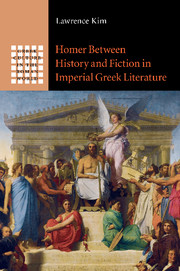Book contents
- Frontmatter
- Contents
- Acknowledgments
- Note on texts, translations, and abbreviations
- 1 Introduction: Imperial Homer, history, and fiction
- 2 Homer, poet and historian: Herodotus and Thucydides
- 3 Homer, the ideal historian: Strabo's Geography
- 4 Homer the liar: Dio Chrysostom's Trojan Oration
- 5 Homer on the island: Lucian's True Stories
- 6 Ghosts at Troy: Philostratus' Heroicus
- 7 Epilogue
- Works cited
- Index
- Index locorum
1 - Introduction: Imperial Homer, history, and fiction
Published online by Cambridge University Press: 06 December 2010
- Frontmatter
- Contents
- Acknowledgments
- Note on texts, translations, and abbreviations
- 1 Introduction: Imperial Homer, history, and fiction
- 2 Homer, poet and historian: Herodotus and Thucydides
- 3 Homer, the ideal historian: Strabo's Geography
- 4 Homer the liar: Dio Chrysostom's Trojan Oration
- 5 Homer on the island: Lucian's True Stories
- 6 Ghosts at Troy: Philostratus' Heroicus
- 7 Epilogue
- Works cited
- Index
- Index locorum
Summary
Near the beginning of his treatise Against Celsus, the third-century Christian scholar Origen conveys the difficulty of his project, a defense of the Gospels' account of Jesus, by an analogy to Greek example:
Before we begin the defence [of Jesus], we must say that an attempt to confirm almost any story as having happened, even if it is true (πᾶσαν ἱστορίαν, κἂν ἀληθὴς ᾖ…ὡς γεγενημένην), and to produce complete certainty about it, is one of the most difficult tasks and in some cases is impossible. Suppose, for example, that someone says the Trojan War never happened (μὴ γεγονέναι), in particular because it is bound up with the impossible story (διὰ τὸ ἀδύνατον προσπεπλέχθαι λόγον) about a certain Achilles having had Thetis, a sea-goddess, as his mother…How could we defend [the historicity of the Trojan War] (κατασκευάσαιμεν), especially as we are embarrassed by the invention (ὑπὸ τοῦ…πλάσματος) which for some unknown reason is woven alongside the opinion, which everybody believes, that there really was (περὶ τοῦ ἀληθῶς γεγονέναι) a war in Troy between the Greeks and the Trojans?
It is probably no accident that Origen selects the Trojan War to illustrate the difficulty of substantiating “true” stories as fact. The war is poised at the chronological end of the ‘mythological’ era and the beginning of Greek history, and while the legends surrounding it are more human-centered and less fantastic than those concerning previous heroic generations, they still feature the divine apparatus and enough “invention” or “fiction” (πλάσμα) to render problematic any simple correspondence to historical reality.
- Type
- Chapter
- Information
- Publisher: Cambridge University PressPrint publication year: 2010

